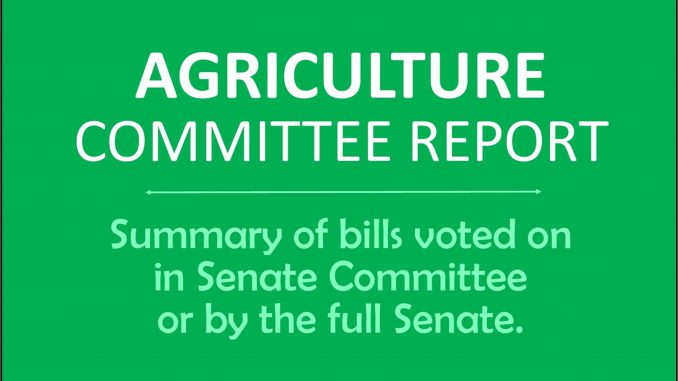
HF 750 – IDALS departmental bill
SF 170 – Agricultural extension council report deadlines & special elections
SF 265 – Wild golden oyster mushroom sales
SF 519 – Agricultural production facility trespass
SF 555 – Weight limits for implements of husbandry
SF 599 – Creating industrial hemp commodity
HF 750 – IDALS departmental bill
HF 750 makes changes within the Iowa Department of Agriculture and Land Stewardship (IDALS) and the Iowa Department of Natural Resources (DNR). Changes include:
- The name of the Weather Bureau is changed to the Climatology Bureau to reflect current practice.
- IDALS rather than DNR may award demonstration grants to those who purchase motor vehicles that use alternative fuels. DNR has not issued a grant in the past 10 years.
- Eliminating a provision authorizing IDALS and DNR to create one or more watershed demonstration projects.
- Authorizing IDALS to use money from the Agriculture Management Account of the Groundwater Protection Fund to support programs, projects and activities to improve surface or ground water.
[4/23: 49-0 (Absent: Petersen)]
SF 170 – Agricultural extension council report deadlines & special elections
SF 170 moves the deadline for county agricultural extension councils to submit annual financial reports from August 1 to September 1. The bill also changes special elections to fill a vacancy on the county agricultural extension council to the next general election.
[3/28: 48-0 (Absent: Breitbach, Nunn)]
SF 265 – Wild golden oyster mushroom sales
SF 265 allows the sale of wild golden oyster mushrooms at farmers markets under authority of the Iowa Department of Inspections and Appeals.
[2/20:48-0 (Absent: Miller-Meeks; Vacant: Danielson)]
SF 519 – Agricultural production facility trespass
SF 519 creates a criminal offense of “agricultural production facility trespass” for a person who, through an act of deception:
- Obtains access to an agricultural production facility that is not open to the public, with the intent to cause physical or economic harm.
- Obtains employment at an agricultural production facility with the intent to cause physical or economic harm.
A person who commits agricultural production facility trespass is guilty of a serious misdemeanor for the first offense and an aggravated misdemeanor for a second or subsequent offense. A person who conspires with another to commit agricultural production facility trespass is guilty of a serious misdemeanor for the first offense and an aggravated misdemeanor for a second or subsequent offense. The bill is effective upon enactment.
In 2012, the new crime of “agricultural production facility fraud” was created by the Legislature after several industrial farm investigations brought national attention to Iowa’s agricultural industry. Lawmakers described the bill—commonly known as the “ag gag” law—as responsive to two primary concerns of the agricultural industry: facility security (biosecurity/security of private property) and harms that accompany investigative reporting.
The 2012 law outlaws (a) obtaining access to an agricultural production facility by false pretenses, and (b) making a false statement or representation as part of a job application at such facility, if the person knows the statement to be false, and making the statement with intent to commit an act not authorized by the owner of the facility, knowing the action is not authorized. A collection of groups, including the ACLU, challenged the 2012 law in court. A January 2019 ruling by a federal judge overturned the 2012 law.
[3/12: 41-8 (No: Bolkcom, Celsi, Hogg, Jochum, Lykam, Mathis, Petersen, Quirmbach; Vacant: Danielson)]
SF 555 – Weight limits for implements of husbandry
SF 555 increases the weight limit to 25,000 pounds for self-propelled implements of husbandry on roads and bridges. This mirrors weight limits for other agricultural equipment.
[3/20: 49-0 (Vacant: Danielson)]
SF 599 – Creating industrial hemp commodity
SF 599 creates an industrial hemp commodity within the Iowa Department of Agriculture and Land Stewardship. The Department will oversee production, regulation and enforcement of industrial hemp, along with establishing fees. The department must conduct an annual inspection of crop sites to ensure hemp tests register less than 0.3% THC.
[4/24: 49-1 (No: Whiting)]
